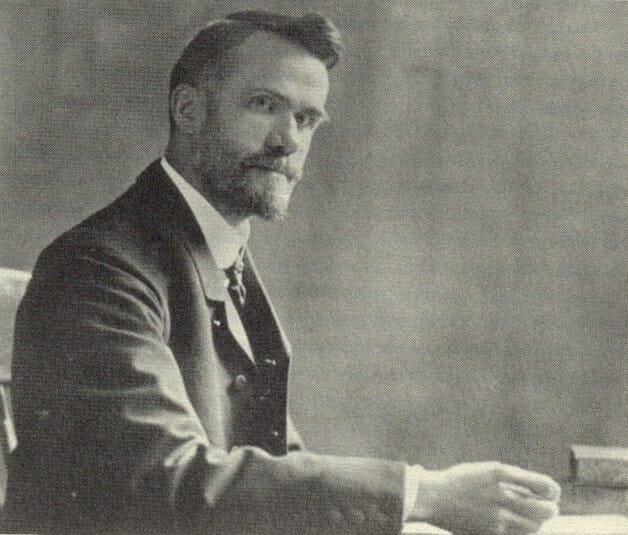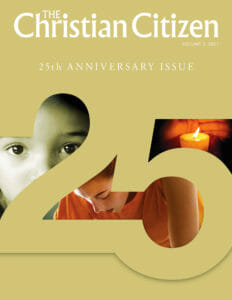
Walter Rauschenbusch
Unknown photographer, public domain (source: Wikimedia Commons)
Walter Rauschenbusch and our time
December 16, 2021
Editor’s note: This month, we are celebrating the 25th anniversary of The Christian Citizen by reprinting articles that previously appeared in print only or on an early version of our website. This article first published in Volume 2, 2007.
Of the Baptist voices that have spoken out for social justice over the years, few have been more widely heard then that of pastor and theologian Walter Rauschenbusch (1861-1918). During his lifetime, Rauschenbusch is books went through multiple printings in North America, were widely read in England, and were translated into several other languages. His thought was formative for the Baptist after Martin Luther King Jr. Indeed, while King popularized the term, we find already in Rauschenbusch’s “A Theology for the Social Gospel,” the church called “the beloved community.”[i] A complex figure with complex thought, Rauschenbusch has remained the subject of books and essays to our own time.
As we ponder Baptist witnesses to social justice, we would do well to ask ourselves what Rauschenbusch would say to us today. To hear this word, we must first appreciate the process by which he discovered the word he spoke to his own time and the attendant tensions with his Baptist heritage.
Rauschenbusch was a lifelong Baptist and retained many characteristics of conservative, pietistic German Baptist life. Yet quite a few of his ideas were at odds with the understanding of most Baptists. He was aware of the variance with his beloved German Baptists, yet he feared that full acceptance of Christian faith in its German Baptist articulation would actually cause him to turn his back on Jesus. Invoking the Baptist principle of personal interpretation, he dissented from the Baptist community in which his faith had been nurtured.[ii]
Why is this? We need to look no further than the principal example of this discontinuity from standard Baptist ideas of his time: the centrality of the kingdom of God.[iii]
The prominent biblical theme of the prophetic ministry of Jesus and the early church, Rauschenbusch argued, had been eclipsed. This eclipse was certainly characteristic of most Baptists during Rauschenbusch’s lifetime, who tended to see the kingdom as a spiritual and individual reality that one entered when one was “saved.” The church was a voluntary association that was to bring more and more persons into the kingdom but that was not actually an aspect of kingdom. The disconnectedness stemmed from individualism resident in American political philosophy that has influenced Baptists in the United States since the Revolutionary period. Though he remained a radical democrat, Rauschenbusch decried individualism as well as the loss of the kingdom.[iv]
Rauschenbusch’s reasons emerged while he served as pastor of New York’s Second German Baptist Church (1886-97). This church was located in the infamous Hell’s Kitchen. Witnessing the effects of Gilded Age economic policies and practices on the poor, Rauschenbusch quickly realized that the standard focus on individual salvation did not fit his situation. Nor did a purely spiritual kingdom provide means to address the conditions of the poor in his ministry context.
Though Baptists in every age can benefit from Rauschenbusch’s theology of the kingdom, I believe his thought concerning the church contains the most fruitful paths for contemporary Baptists. The church is still afflicted by an individualism that has made us vulnerable to the acids of consumerism that would leave us unable to discern our prophetic ministry in the world.
As his theology took shape, friends and family cautioned him against the direction in which he was moving. Yet he realized the need to “go against all that I had previously been taught. I had to go back to the Bible to find out whether I or my friends were right.”[v] He came to conclude, “We shall have to be socially right if we want to be religiously right.”[vi] Thus his turn to the Bible led to his “discovery” of the kingdom of God.
 Just as important, Rauschenbusch came to a different understanding of what it is to be human. While he never lost sight of the dignity and importance of each person (he critiqued the socialists for this loss), he came to see that no one truly exists as an “individual” alone but is always embedded in social contexts that include “super-personal beings,” such as corporations. Thus sin and salvation are mediated through communal structures. “The individual is saved, if at all, by membership in the community which has salvation.”[vii]
Just as important, Rauschenbusch came to a different understanding of what it is to be human. While he never lost sight of the dignity and importance of each person (he critiqued the socialists for this loss), he came to see that no one truly exists as an “individual” alone but is always embedded in social contexts that include “super-personal beings,” such as corporations. Thus sin and salvation are mediated through communal structures. “The individual is saved, if at all, by membership in the community which has salvation.”[vii]
Though Rauschenbusch was always wary of arid and spiritless ecclesiasticism, his account of the human being as irreducibly social entailed a nuanced concept of the church. The church, he said, is the social factor in salvation. To enter the church was not to enter the kingdom, yet it was to enter its partial and earthly realization. Only at the Second Coming would the kingdom and the church be one.[viii]
Though Baptists in every age can benefit from Rauschenbusch’s theology of the kingdom, I believe his thought concerning the church contains the most fruitful paths for contemporary Baptists. The church is still afflicted by an individualism that has made us vulnerable to the acids of consumerism that would leave us unable to discern our prophetic ministry in the world.[ix] This prophetic ministry was Rauschenbusch’s desire. He wanted people to ask with understanding, “What is right?”[x] He wanted the church, that is, to be a community capable of forming persons and sustaining them in the work of social justice as it witnesses to the kingdom.
Rauschenbusch gave concrete pieces of guidance on how persons may be formed in his discussion of church practices. I would briefly note three. First, he urged a renewal of catechesis as prebaptismal formation. He described it as an “exorcization to break the infection of the sinful and illusive world-order and to explain the nature of a distinctively Christian order of life.”[xi] Second, he wished to make reconciliation with God and fellow human beings the focus of the Lord’s Supper, in this ritual thus affirming the solidarity of all humanity before God. Finally, in the best tradition of his pietistic heritage, he affirmed both private and public prayer as the ongoing means to “more social repentance and less angry resistance to the demands of justice and mercy.”[xii]
In these ways, the church may offer itself to Christ as a collective memory of Jesus’ radical vision of the kingdom come, on earth as it is in heaven.
Philip E. Thompson is professor of Systematic Theology and Christian Heritage at Sioux Falls Seminary (formerly North American Baptist Seminary), Sioux Falls, South Dakota.
The views expressed are those of the author and not necessarily those of American Baptist Home Mission Societies.
[i] Walter Rauschenbusch, A Theology for the Social Gospel (New York and Nashville: Abingdon, 1917), 127. See Christopher H. Evans, The Kingdom is Always but Coming: A Life of Walter Rauschenbusch (Grand Rapids, Mich.:Eerdmans, 2004), 320-21.
[ii] Klaus Juergen Jaehn, Rauschenbusch: The Formative Years (Valley Forge, Pa.: Judson Press, 1976), 12.
[iii] I will retain this term, acknowledging its gender exclusive quality; it was the term Rauschenbusch used. It has a concreteness that more inclusive alternatives such as “Reign of God” lack. This concreteness is important to the prophetic imagery we find in Rauschenbusch.
[iv] See, for example, Rauschenbusch, Theology for the Social Gospel, 123; and Walter Rauschenbusch, Prayers for the Social Awakening (Boston: Pilgrim, 1910), 17-19.
[v] Quoted in Stanley Hauerwas, A Better Hope: Resources for a Church Confronting Capitalism, Democracy, and Postmodernity (Grand Rapids, Mich.: Brazos, 2000), 72.
[vi] Rauschenbusch, Prayers for the Social Awakening, 21.
[vii] Rauschenbusch, Theology for the Social Gospel, 126-7. For the implications of super-personal sin, see ibid., 119.
[viii] Ibid., 119-132.
[ix] See, for example, James V. Brownson et al., Storm Front: The Good News of God (Grand Rapids, Mich.: Eerdmans, 2003).
[x] Jaehn, 16.
[xi] Rauschenbusch, Theology for the Social Gospel, 200.
[xii] Rauschenbusch, Prayers for the Social Awakening, 12.


